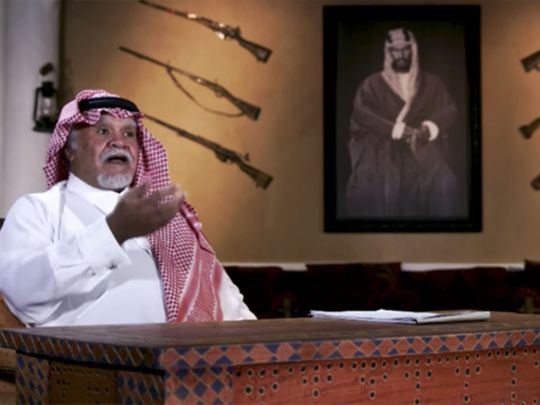
Palestinian leaders are “failures” who have consistently missed opportunities for a settlement with Israel and who are aligning themselves with the enemies of Saudi Arabia, the former Saudi ambassador to the US and intelligence chief Prince Bandar bin Sultan said in an interview with Saudi-owned al-Arabiya TV that aired a series with the prince for three nights.
The Palestinian cause is a just cause, but its advocates are failures. The Israeli cause is unjust, but its advocates are successful. That sums up the events of the last 70 or 75 years
Saudi Arabia's former intelligence chief and ambassador to the United States, Prince Bandar bin Sultan bin Abdulaziz, said the kingdom must focus on its own interests and security while supporting the Palestinian cause. In the final episode of a three-part interview with Saudi-owned Al Arabiya television aired on Wednesday, Prince Bandar once again criticised Palestinian leaders.
“The Palestinian cause is a just cause, but its advocates are failures. The Israeli cause is unjust, but its advocates are successful. That sums up the events of the last 70 or 75 years,” he said. Adding "We are at a stage in which rather than being concerned with how to face the Israeli challenges in order to serve the Palestinian cause, we have to pay attention to our national security and interests," Prince Bandar in the interview criticised the Palestinian leadership for their "transgression" and "reprehensible discourse", in opposing the decision of some Gulf states to normalise ties with Israel.
The United Arab Emirates agreed a historic deal to normalise relations with Israel in August, and the Gulf state of Bahrain, a close Saudi ally, followed suit in September. The deals are seen as a strategic realignment of Middle East countries against Iran. Saudi Arabia has not directly commented on the normalisation deals, but has said it remains committed to peace on the basis of the Arab Peace Initiative.
Prince Bandar said Palestinian leaders had high regard for "new players into the picture" such as Iran and Turkey, than Riyadh and other Gulf countries. "Turkey occupies Libya and wants to liberate Jerusalem by withdrawing its ambassador from Abu Dhabi. Iran wants to liberate Jerusalem through the Houthis in Yemen or through Hezbollah in Lebanon and Syria," he said.
He spoke at length about the decades-long support of successive Saudi kings and other Gulf countries to the Palestinian cause, adding that the denial of these efforts from Palestinian leaders will not affect the attachment to the cause. "Things are clear and we are at our limit with those guys," he said.
He discussed the history of Saudi-Palestinian relations. He harshly criticized the Palestinian leadership for what he deemed to be repeated missed opportunities to reach an accord with Israel, and for taking Saudi aid while ignoring Saudi political counsel. “I believe that we in Saudi Arabia, acting on our goodwill, have always been there for them. Whenever they asked for advice and help, we would provide them with both without expecting anything in return, but they would take the help and ignore the advice. Then they would fail and turn back to us again, and we would support them again, regardless of their mistakes,” bin Sultan said.
“We even went further as a state and justified to the whole world the actions of the Palestinians, while we knew that they, indeed, were not justified, but we did not wish to stand with anyone against them.” Prince Bandar explained that consistent Saudi aid to Palestinian leaders may have led them to take the Gulf for granted. "I think [our support] created a sense of indifference on their side, and they have become convinced that there is no price to pay for any mistakes they commit toward the Saudi leadership or the Saudi state, or the Gulf leaderships and states,” he said.
Bin Sultan discussed both the 1948 partition plan and the 1979 Camp David Accords with Egypt, both of which could have led to the establishment of a Palestinian state or Palestinian self-rule. Accused late Palestinian leader Yasser Arafat of lacking the political courage to accept the Camp David Accords, saying that even Arafat admitted their provisions were better than the Oslo Accords, which he ultimately signed with Israel in 1995.
Prince Bandar served as the Saudi ambassador in Washington for over 30 years, as well as in several high-level intelligence positions after his return to Riyadh. He led Saudi Arabia’s security services from 2012 to 2014, also directing the Saudi National Security Council for over a decade.








